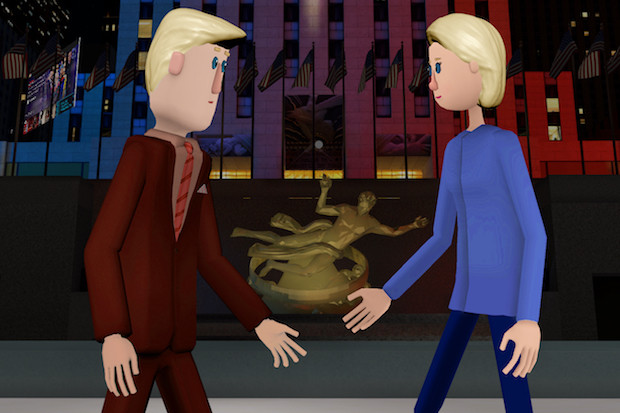For each presidential election cycle in the US, NBC News takes over the space outside Rockefeller Center in New York City to create an interactive experience that celebrates democracy.
People can visit the Democracy Plaza in the run up to election day to have their picture taken in a replica of the Oval Office or to record a mock report as if they were NBC News anchors, for example. They can also watch the results as they come in on the day the vote takes place, when the ice rink in the plaza is turned into a map of the US and the states are coloured blue or red depending on which candidate is leading.
For the 2016 election, NBC News wanted to do something different using the space, so the organisation worked with software company AltspaceVR to recreate the Democracy Plaza in virtual reality.
"We wanted to do something different and new, with the idea that we had some restrictions on the Democracy Plaza in real life, which we only had for about two days [around the elections]," said Steve Veres, director of strategic content for NBC News.
"But in the virtual world, we had it for about 48 days before the election and we scheduled a slate of programming to inform, educate and connect people to our talent and the election in new ways."
AltspaceVR & @NBCNews present Virtual Democracy Plaza! We're bringing you live news in #VR. https://t.co/7looQKrDJB pic.twitter.com/am2qwWLYOE
— AltspaceVR (@AltspaceVR) September 21, 2016
Since the Virtual Democracy Plaza went live in late September, NBC News hosted more than 11 events in this format running up to election day. The experiment included a virtual reality Q&A session with Today Show anchor Al Roker, an analysis of the polls and the state of the race conducted by MSNBC political correspondent Steve Kornacki, and a conversation about cybersecurity and democracy with Kor Adana, writer and technology producer on TV series Mr Robot.
The presidential and vice-presidential debates were also livestreamed in the virtual reality space, and for all these events, people were able to join in by creating a free profile on AltspaceVR, which they could customise to resemble them as closely as possible.
Viewers were able to move around in the Virtual Democracy Plaza and interact with each other by talking, sending emojis, selfies and images, and they could also ask the anchors questions.
Veres explained that when one of the virtual events featured speakers, the software would mute the rest of the audience so the focus was on the conversation taking place on stage. For the Q&A portion of the programming, if a member of the audience wanted to ask something, they would "raise their hand" via an emoji and their question would then be broadcast and amplified to everyone in attendance.
Viewers could access the Virtual Democracy Plaza through the AltspaceVR app on devices such as Oculus Rift, HTC Vive and Samsung Gear VR, but a 2D version was available for those without headsets and the events were also livestreamed on YouTube.

Most of the sessions lasted between 45 minutes and an hour, with the exception of election night, where people could tune in and out of the virtual reality plaza for about eight hours. Overall, the VR output of NBC News amounted to some 30 hours of coverage, with "thousands of people joining" throughout the events, and Veres said viewers were spending 50 minutes on average in the immersive environment.
NBC News had experimented with 360-degree video before, he added, producing short form videos for its online VR hub, but it was the first time the organisation attempted live events in virtual reality.
"What intrigued us about this experience was that it was really about one-to-one communication," Veres said.
"Our anchors are great and we try to give our audience access to them them via Facebook Live and Twitter, but that always feels one step removed because of the platform limitations.
"With the custom avatars we created for Al Roker and Meet the Press moderator Chuck Todd, people were able to interact with the anchors as if they were right next to them, answering their questions, even though they were in a virtual world."
While the Virtual Democracy Plaza cannot be easily repurposed for other projects, NBC News will be looking at how virtual reality and similar spaces can be used for upcoming news events.
"We learned a lot quickly about what personalities we need in this space and about the challenges around livestreaming and mirroring an environment to multiple people so that the pages were light enough to load quickly.
"I think we were the first news organisation to program multiple events in AltspaceVR, so we were pioneering with them what it means to have these live events with people in a sustained programming manner," said Veres.
Free daily newsletter
If you like our news and feature articles, you can sign up to receive our free daily (Mon-Fri) email newsletter (mobile friendly).
Related articles
- New resources to help journalists fight elections misinformation
- The Big Issue experiments with interactive storytelling to help readers explore homelessness
- Jenni Sargent, managing director at First Draft, on language around false claims, reaching sceptical audiences and collaboration
- Al Jazeera uses 360-video to show the scale of destruction in Yemeni civil war
- Mobile-first mag Frame helps younger audiences engage with the news










